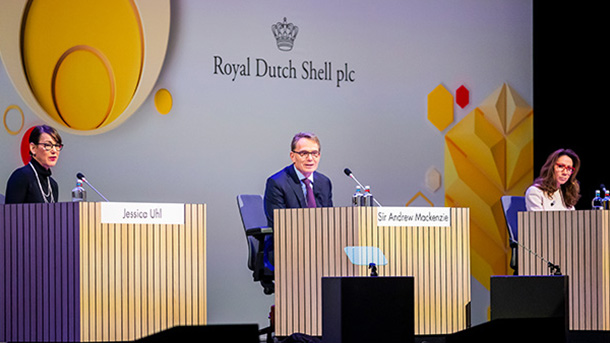Introduction from the Chair

Looking back on 2022, I am heartened by the drive and resolve of our people. Their ingenuity when managing complex problems, their enthusiasm in the face of challenge, and their industry-leading innovations. I am confident that they are positioning Shell effectively to be successful through the energy transition and the challenging journey we face ahead.
We are at the start of a new leadership chapter in Shell’s history. Early in 2022, following the move of our headquarters from the Netherlands to the UK, Jessica Uhl who at the time was Chief Financial Officer, took the decision that a long-term relocation to the UK was not sustainable for her and her family. She therefore stepped down from her role and Sinead Gorman was appointed CFO from April 1, 2022. The Board is immensely grateful to Jessica for her tremendous contribution to Shell over many years. In September 2022, we announced that Ben van Beurden, at the time Chief Executive Officer (CEO), would retire from the Board. Ben has been succeeded by Wael Sawan, who took the role of CEO from January 1, 2023. During the last decade, Ben has been in the vanguard for the transition of Shell to a net-zero emissions energy business by 2050. He has become a leading industry voice on some of the most important issues affecting society today. Ben’s legacy will frame Shell’s success for decades to come.
Both Wael and Sinead are very clear on the challenges that Shell faces to secure the supply of affordable energy for all parts of society, and encourage investment into forms of energy and solutions that help reduce emissions, whilst maintaining a profitable business that is cash flow positive. Making the most of the opportunities, risks and rewards confronting the business is a complex task, and as we move forward, the way in which we manage, govern and operate our business will evolve.
Our recent independent Board evaluation has provided some thought provoking discussion in this area, and more on this can be found in section “Board activities and evaluation”.
As I reflect on the financial results of 2022, I do so with mixed emotions. Across the business, the performance of our people has been exceptional. They are each settling into their new normal for living with COVID-19, and many of our office-based staff now adopt a more flexible way of working, splitting their working week between the office and their homes. The macroeconomic uncertainty around prices and demand for oil and gas products, which had impacted Shell in 2020 generating losses of some $21.5 billion has now contributed, in part, to the 2022 income. Our robust earnings in 2022 have underpinned the return of $25.8 billion to shareholders through share buybacks and dividends. Capital expenditure of $22.6 billion was invested for the future of the organisation and net debt is now down to $44.8 billion.
However, a factor driving some of this macroeconomic uncertainty is the Russian invasion of Ukraine, which has generated a humanitarian disaster, population displacement and heightened concern from neighbouring countries in the region. As well as being a human tragedy, the war has led to rising energy prices and deep uncertainty about supplies. This disruption in the global energy markets has contributed to a painful increase in the cost of living and highlighted that affordable, secure and reliable energy cannot be taken for granted. Although higher oil and gas prices have contributed to Shell’s performance, we must also recognise that Shell is now generating better value on the volumes that it produces, helped by the significant operational transformation of the organisation over the past 10 years. This transformation has helped us to achieve our highest ever adjusted earnings of $40 billion, which is around $17 billion higher than in 2014, when Brent prices were at a similar level as that in 2022.
As Wael shared earlier in this report, as the issues in Ukraine unfolded, our actions were guided by continuous discussions with governments about the need to disentangle society from Russian energy flows, while maintaining energy supplies. Our immediate focus was the safety of our people in Ukraine and supporting our people in Russia. In discussion with governments around the world, we worked through the detailed business implications, including the importance of secure energy supplies to Europe and other markets, in compliance with relevant sanctions. Throughout this crisis Shell has continued to focus on the support it can provide to the Ukrainian people.
The energy supply issues seen throughout Europe, as a result of the Russia/Ukraine conflict, have highlighted that the solution to the climate challenges confronting society is not as simple as stopping the extraction of oil and gas and wholly shifting capital investment into other areas. Crucially, the cash flows from oil and gas also help fund Shell’s investments in energy businesses and energy solutions that contribute to reducing emissions. These help Shell, our customers and entire sectors to cut emissions and accelerate the energy transition. The cash generated by Shell’s oil and gas operations provide returns to our investors, which include global pension funds, governments, insurance companies and investment products through which the general public invest. Society remains heavily reliant on oil and gas, and it is all too clear that the reduction in supply is driving up market prices and contributing to a cost of living crisis in many areas of the world.
The situation in Europe has encouraged society to work together to deliver change, and it is promising to see governments, companies and society working more closely to determine what is needed to drive this change. Our detailed policies serve as a global framework for Shell’s advocacy with governments, international organisations, industry associations, coalitions, and other stakeholders globally, regionally and within countries. The energy transition will require many billions of dollars of investment. When governments provide clear direction and regulation with a stable tax environment, companies can invest more in this transition.
Energy transition strategy
In February 2021, Shell announced its intention to put its energy transition strategy to shareholders for an advisory vote every three years, with the first vote being a resolution at the 2021 AGM. This was an important step for Shell and the first time that an energy company asked shareholders to vote on its energy transition strategy. Shareholders endorsed the energy transition strategy, with 89% voting in favour of this resolution. At the 2022 AGM, almost 80% of shareholders that voted supported our progress in this strategy, and shareholders will be asked again with the same resolution being put to the 2023 AGM. In 2024 our energy transition strategy itself will come back to shareholders for an advisory vote and we will be engaging on this strategy through the latter part of 2023. Our target to become a net-zero emissions energy business by 2050 stands strong and shareholder support is important as our business changes.
Board leadership and Shell’s purpose
The UK Corporate Governance Code (the “Code”) provides that the board should promote the long-term sustainable success of the company, generating value for shareholders and contributing to wider society. The Board believes that Shell’s efforts give it an effective framework to play its part in the energy transition as a growing, successful, commercial organisation. In the Board’s view, this framework will allow Shell to provide the energy solutions that consumers will want and buy in this period of uncertain change. The Board also thinks that Shell will be able to deliver against its recently published targets and reduce the carbon intensity of the energy products it sells.
Shell's purpose is set out in the early pages of this Annual Report. Throughout this Governance report we will focus on how Shell’s governance operates in practice, and why we believe this is the best approach for us.
The Governance report is structured around the key themes of the Code. Our narrative seeks to explain how governance supports and protects Shell and our stakeholders.
Although Shell applies the principles and the spirit of the Code, there is one instance where we adopt an approach slightly different from that suggested by one of the Code’s provisions, namely Provision 5 which concerns workforce engagement. We explain this in section “Statement of compliance with the UK Corporate Governance Code”. We consider our governance processes are appropriate, given the specific circumstances and range of factors particular to Shell, such as its global nature, size, complexity and history.
The last couple of years have encouraged and challenged society to become more accepting of technology to facilitate virtual engagement. For our business this has led to significant cost savings in the area of travel, and helped our people to spend more time with their families. For our stakeholders, we now have the ability to engage more, and reach a wider audience. For shareholders, our AGM is a hybrid meeting, allowing our global shareholder base to easily participate in proceedings.
Information on how the Board discharges its duty in relation to key stakeholder interests, including those of our workforce, and an explanation of how it considered these when making principal decisions are set out in section “Understanding and engaging with our stakeholders”. In the section “Board activities and evaluation” we provide information about our Board activities and highlight which stakeholders we considered.
Our workforce engagement methods remain unchanged from those previously disclosed. As we moved out of the parameters of COVID-19 restrictions the Board was able to undertake a greater level of face-to-face engagement with Shell people during the year. More on this can be found in section “Workforce engagement”. We continue to believe that constructive relationships built on mutual respect and transparency help Shell attract and retain employees while supporting greater productivity and operational safety and efficiency. Ensuring that the employee voice is heard on relevant matters in the boardroom in practical ways is key to understanding the broader impact of business decisions, including with respect to organisational culture.
The Board recognises the importance of culture in delivering Shell’s purpose and strategy. Shell’s culture reflects the values of the organisation – honesty, integrity and respect for people. These underpin all the work we do and are embedded in our strategy and purpose. We make sure that the voices of employees are heard on relevant matters so that we understand the impact of business decisions on organisational culture. The Board will continue to increase its focus on Shell’s culture to make sure it aligns with the broader business strategy.
Division of responsibilities
More information on how the Board and its Committees support business operations is provided in the section “Board activities”. Further detail is contained within the Terms of Reference for each Committee, and the Matters Reserved for the Board, which are provided on our website. Each year the Committees’ Terms of Reference are reviewed and updated, as required.
Composition, succession and evaluation
For biographies of current Board members see section “The Board of Shell plc”.
For how the Board, Committees and Directors appraised their performance see section “Board activities and evaluation”.
An overview of the CEO succession process is included in section “Nomination and Succession Committee”.
During the year Jessica Uhl stepped down as Chief Financial Officer (CFO) of Shell plc, effective March 31, 2022. Sinead Gorman was appointed CFO of Shell plc, effective April 1, 2022. Ben van Beurden stepped down from his role as Chief Executive Officer (CEO) at the end of 2022, his successor was Wael Sawan. Wael’s appointment as CEO was effective January 1, 2023. Wael is an exceptional leader, with all the qualities required to drive Shell safely and profitably through its next phase of transition and growth.
The 2022 AGM was Gerrit Zalm’s last day with Shell, after nine years’ service as a Non-executive Director. Gerrit is a highly regarded and seasoned leader. He provided insightful counsel and deep understanding of global business and we thank him for his nine years of valuable contribution to the business.
Following Gerrit’s departure, Committee memberships were reviewed. Jane Holl Lute stepped down from the Audit Committee and joined the Safety, Environment and Sustainability Committee and Bram Schot joined the Remuneration Committee.
In October 2022 we announced the appointment of Cyrus Taraporevala as a Non-executive Director of the Company, effective March 2, 2023. Cyrus became a member of the Company’s Audit Committee on the same date.
In February 2023 we announced that:
- Euleen Goh will stand down from her role as Deputy Chair and Senior Independent Director at the 2023 AGM after nearly nine years’ service. She has provided invaluable advice to me as Chair, and I wish her all the best for her future endeavours;
- Following the departure of Euleen, Dick Boer will become Deputy Chair and Senior Independent Director with effect from the conclusion of the 2023 AGM;
- Martina Hund-Mejean will stand down from her role as Non-executive Director from the conclusion of the 2023 AGM. She leaves with our best wishes and we thank her for her valuable contributions;
- Sir Charles Roxburgh and Leena Srivastava were appointed as Non-executive Directors of the Company, with effect from March 13, 2023. Their biographies are provided in section “The Board of Shell plc”; and
- Changes were made to the membership of our Board Committees. These changes are reflected in the biographies of the respective Directors.
Audit, Risk management and Internal control
Throughout the year the Audit Committee assisted the Board in maintaining a sound system of risk management and internal control and oversight over Shell’s financial reporting. A variety of standing matters and more specific topics are discussed by the Audit Committee throughout the year. As part of the year-end reporting process, the Audit Committee advises the Board on the adequacy of the system of risk management and internal control, the appropriateness of the viability statement and going concern basis of accounting. The Audit Committee also advises on whether this Annual Report, taken as a whole, is fair, balanced and understandable and provides the information necessary for stakeholders to assess Shell’s position and performance, business model and strategy.
More information on the Audit Committee’s activities, highlights and priorities can be found in its report.
Looking ahead
Shell has already started to evolve its business. Some of the steps are more visible, such as investment in new business operations, acquisitions and divestments, other steps less visible, like internal organisational changes or policy change. We are very aware that the steps of our transformation will be intensely scrutinised by society and the environment in which we operate will continue to change rapidly. Under our renewed leadership, Shell will be steadfast, agile and sensitive to the opportunities, risks and rewards confronting the business.
We are cognisant, yet accept, that not all of our stakeholders will be fully supportive of the decisions that we take, and these stakeholders will have differing methods of communicating their views and their concerns. However, we will continue to engage with stakeholders, and we will have the humility to listen, learn and adapt as we focus and frame our strategy on the long-term success of the Company.
I, my fellow Directors on the Board, and our colleagues across the business, remain confident that Shell is up to the task ahead.
Sir Andrew Mackenzie
Chair
March 8, 2023










